| |

IF YOUR NEWSLETTER IS HARD TO READ OR IF THE LINKS DON'T WORK,
Please copy and paste this address into your browser window:
http://www.helpforibs.com/news/newsletter/strawshort052604.html
May 26, 2004
This week ~ Dangers of Aloe & Senna for IBS
Hello to everyone -
This week we welcome summer with a delicious strawberry shortcake, and as always we have the latest digestive health research findings. Plus, learn why using a plant you probably think of as safe for IBS may actually lead to serious health problems, including colon cancer. Who would have thought aloe vera could be bad for you? Keep reading to learn just why it can be downright dangerous.
Best Wishes,
Heather Van Vorous
Note: Did a friend send you this newsletter? Sign up here for your own free subscription.

Summer Strawberry Shortcake
Makes 6 servings
Feel free to substitute fresh peaches, apricots, or mangoes for the strawberries!
Strawberry Topping:
6 cups hulled and diced fresh strawberries
Sprinkle of granulated sugar
Splash rum, Grand Marnier, or fresh orange juice (optional)
Vanilla soy, rice, almond, or oat milk
Shortcakes:
2 cups all-purpose flour
2 t baking powder
1/4 t baking soda
1/2 t salt
2 T granulated sugar (optional)
1/4 cup canola oil
1 cup soy milk blended with 1 t apple cider vinegar
In a large bowl combine strawberries with sugar and rum. Let sit to macerate (the strawberries will release their juices) while you make the shortcakes.
Preheat oven to 425F. Lightly spray a cookie sheet with oil and set aside. In a medium bowl sift flour, baking powder, baking soda, salt, and sugar. Whisk until well blended. Stir the oil and soy/vinegar mixture together. Add the oil mixture to the dry ingredients and stir with a fork until well-combined. Drop the dough by large spoonfuls onto the prepared cookie sheet (should yield about 12 shortcakes). Bake for about 15 minutes, or until golden brown, and a toothpick inserted into a shortcake comes out clean. Cool shortcakes on rack.
While shortcakes are still warm, split in half. For each serving, top two halves of shortcake with a generous spoonful of strawberries, then top berries with two more shortcake halves. Drizzle vanilla soy milk around shortcakes as desired, and serve immediately. It's summer in a bowl!
For hundreds of other delicious IBS recipes, come visit the IBS Recipe Board.
Are you just learning how to eat for IBS? A little intimidated at the thought of special IBS recipes? Not quite sure just what makes these recipes special in the first place? Don't worry! Come see
the IBS Diet pages, and find the answers to all your questions.
~ Heather's Tummy Tamers Peppermint Oil Capsules ~
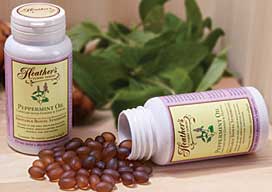
Peppermint Oil Caps Called "Drug of Choice for IBS"
Our Peppermint Oil Caps have the added benefits of fennel and ginger oils, and they help prevent abdominal pain, gas, and bloating!
 Cancer Society Promotes Disease with Beef Fundraisers, Say Doctors
Cancer Society Promotes Disease with Beef Fundraisers, Say Doctors
The Physicians Committee for Responsible Medicine (PCRM) is calling on the American Cancer Society to put an end to its "Cattle Barons' Ball" events - beef-themed fundraisers promoting the very disease the cancer research and prevention giant is committed to curing. The fundraisers feature Western and cowboy themes, including "chuck wagons" loaded with beef and other meats. More than 30 are held each year, mostly in the South and Southwest, almost two-thirds of them in Texas and Florida.
"It is irresponsible of the American Cancer Society to sponsor events that promote beef consumption," said PCRM Nutrition Director Amy Joy Lanou, Ph.D. "For more than 20 years, major scientific studies have linked beef and other meats with increased risk of cancer, particularly colorectal cancers."
A 1990 Harvard University study published in the New England Journal of Medicine linked regular meat consumption with a three-fold increase in colon cancer risk and a higher risk of cancer overall. Colorectal cancer is the second leading cause of cancer-related deaths in the United States for both men and women. Lanou notes that the American Cancer Society is well aware of the association between meat and cancer.
"Recommendations to limit the consumption of red meat appear frequently in ACS educational materials, news reports, and on the ACS Web site. Given this, it is wholly inappropriate for the American Cancer Society to sponsor fund-raisers that promote the eating of beef," she said.
Check here for more
information...
Moms with IBS Take Baby to Doctor More
Mothers with irritable bowel syndrome (IBS) may be more likely than other women to seek a doctor's help when their babies have colds or other common ills, a UK study suggests. The findings, according to researchers, suggest that learned responses to bodily symptoms early in life could help explain why the children of people with IBS tend to be more affected by bowel symptoms later in life.
Why people differ in their reactions to IBS symptoms, and why symptoms interfere with daily life in some individuals but not in others, is unknown, according to Dr. Catherine Crane of the University of Oxford, the new study's lead author. Previous research has suggested that children whose parents have IBS are both more likely to be taken the doctor as kids and more likely to complain of bowel symptoms as adults, Crane told Reuters Health.
One theory is that these individuals may be particularly sensitive to such symptoms because of the influence of their parents. The new findings, according to Crane, suggest that differences in how parents respond to their children's illnesses could be part of this learning process.
Check here for more
information...
Pharmaceutical Companies Funding a Number of IBS Studies in the UK
Researchers at The University of Nottingham, England have picked up almost £1 million in funding for a number of studies into IBS. The team in the Division of Gastroenterology at the University, led by Professor Robin Spiller, are looking at various aspects of Irritable Bowel Syndrome (IBS) in a bid to increase our understanding of the mechanisms that underpin the condition and to develop new treatments for patients.
They have received £434,563 in funding from the drug company GlaxoSmithKline for a study examining evidence for inflammation of the gut in IBS patients. It is believed that some IBS patients may have a genetic predisposition to this kind of inflammation, which is usually associated with other bowel disorders such as Crohn' disease and ulcerative colitis. Often these patients have to undergo many tests that turn out to be unnecessary before being correctly diagnosed with IBS.
The researchers have also received £172,914 from NovartisPharma and £360,000 from the Biotechnology and Biological Sciences Research Council to look at the role of serotonin in IBS. Serotonin is a ubiquitous signalling molecule used throughout the brain and gut to transmit impulses. The over-production of serotonin can cause vomiting and diarrhoea and part of the study is looking at whether serotonin levels can be altered by introducing different molecules into the system.
The researchers are seeking patients with IBS to take part in the study and anyone interested should contact Marguerite Richards on 0115 924 9924 ext 36804 or ext 44970 or by e-mail at marguerite.richards@nottingham.ac.uk
Check here for more
information...
Nutrition Experts Say Trans Fats Disastrous for Health, Push Total Ban
A campaign is being launched to purge the molecules called trans-fatty acids, or "trans-fats", from the United States' processed foods such as cakes, snacks and fast foods. Small quantities of trans-fats occur naturally in meats and dairy products, but most arrive in our stomachs through processed foods containing hydrogenated oils. Trans fats are manufactured by pumping hydrogen into vegetable oils to create partially hydrogenated oils and solid margarines.
Such fats are preferred by the food industry because they are versatile and last longer. But nutrition experts say trans-fats are disastrous for your health. Whereas saturated fats raise both 'bad' low density lipoprotein cholesterol (LDL) and 'good' high density lipoproteins (HDL), trans-fats boost LDL without affecting HDL, increasing the risk of heart disease.
Nutritional guidelines have long advocated cutting back on the saturated fatty acids found in meat and dairy products, and boosting unsaturated fats abundant in nuts, seeds and vegetable oils.
Trans-fats have taken longer to attract attention because their effects on health were less clear.
Evidence for the harmful effects of trans-fats has mounted, however. In 2002, a US expert committee charged with making nutritional recommendations concluded that there was no level of trans-fats in the diet that could be deemed safe.
Check here for more
information...
Too Much Drinking Could Serve Up Colon Cancer
People who drink more than three glasses of wine, beer or liquor a day may increase their risk of colorectal cancer by 40 percent, according to a Brigham and Women's Hospital study in the April 20 issue of the Annals of Internal Medicine.
Consuming two average-size alcoholic drinks a day was associated with a small increased risk for colorectal cancer.
In this study, researchers analyzed data from eight studies that tracked nearly half a million people for up to 16 years. This new study is one of the largest to show that any kind of alcohol can influence a person's risk of colorectal cancer.
Check here for more
information...
IBS and a Model of the Brain-Gut Interactions
Brain-gut interactions are increasingly recognized as underlying pathomechanisms of functional gastrointestinal disorders such as IBS. Bi-directional communication between the central nervous system (CNS) and the enteric nervous system (ENS) occurs both in health and disease. Various CNS- and gut-directed stressors stimulate the brain-gut axis. Processes modulating responsiveness to stressors along the brain-gut axis involve neural pathways, the immunological, and endocrinological mechanisms.
Disturbances at every level of neural control of the gastrointestinal tract can affect modulation of gastrointestinal motility, secretion, immune functions as well as perception and emotional response to visceral events. ENS function, central processing, and autonomic regulation play an important role in the brain-gut dialogue. Stress and emotions may trigger neuroimmune and neuroendocrine reactions via the brain-gut axis. Various non-site specific neurotransmitters influence gastrointestinal, endocrine and immune function, as well as human behavior and emotional state, depending on their location.
The physiology of the digestive tract, the subjective experience of symptom, health behavior, and treatment outcome are strongly affected by psychosocial factors. Recently, a biopsychosocial model of IBS containing physiological, emotional, cognitive and behavioral components has been proposed. Rapid progress in neurogastroenterology, using new brain imaging techniques, should bring better understanding of the brain-gut axis and open new perspectives.
Check here for more
information...
Looking for the latest IBS research and news?
Check out the IBS Research Library!
Still learning the fundamentals of IBS and all the ways to manage it?
Check the IBS page in our comprehensive Irritable Bowel Syndrome Glossary!
  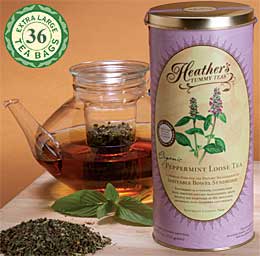
Organic High Volatile Oil Fennel & Peppermint Tummy Tea Bags
Extraordinary Quality ~ Very Economical
Fennel is terrific for bloating & gas, Peppermint is great for IBS pain & spasms.
Heather's Fennel Tummy Tea Heather's Peppermint Tummy Tea
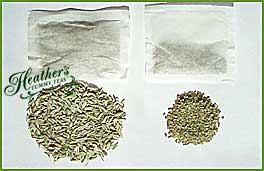  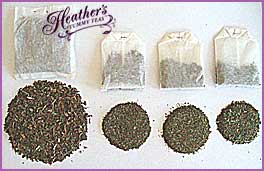
Compare for yourself! The pictures above show the huge difference in the quantity and quality of tea per teabag. The price comparison here is even more shocking!
 Aloe Vera and IBS
Aloe Vera and IBS
"Can aloe vera help my IBS symptoms? Is it safe?"
Because aloe is well-known as a gentle external treatment for minor burns and skin irritations, it's easy to assume that it would be safe for use internally as well. This is not necessarily true. Even though aloe vera is a plant, and thus "natural", it is still classified by the FDA as a Class 1 harsh stimulant laxative. There are substances called anthroquinones and anthrones in aloe, which produce a laxative effect by increasing colonic peristalsis and intestinal water content, by opening chloride channels of the colonic membrane to cause a net reduction of liquid absorption by the colon.
In plain English, this means that aloe causes faster and stronger contractions of the colon - something that people with IBS are already overly prone to, and which can cause violent abdominal cramps, painful spasms, and diarrhea.
The safety of aloe is another concern. All anthranoid laxatives (not just aloe, but senna and cascara sagrada as well) can cause melanosis coli, cathartic colon, and possibly increase the risk of colonic cancer. (In fact, genotoxicity studies show that aloe-containing laxatives pose cancer risks to humans even when used as directed.)
Melanosis coli, normally a benign condition, is characterized by black pigmentation of the colonic wall, and is almost always attributable to anthranoid laxatives such as aloe, cascara, or senna. Melanosis coli usually develops 9 months after initiating the use of anthranoid laxatives, and typically disappears just as quickly after the drug is discontinued. In severe cases, however, it may reduce bowel function and make constipation worse. In advanced cases of melanosis coli, the inside lining of the colon becomes pitch black instead of the normal light pink.
Cathartic colon is the anatomic and physiologic change in the colon that occurs with chronic use of stimulant laxatives such as aloe (chronic use is defined as more than 3 times per week for at least 1 year). Signs and symptoms of cathartic colon include chronic constipation, bloating, a feeling of fullness, abdominal pain, and incomplete fecal evacuation. Radiologic studies of a patient with cathartic colon will show: an atonic colon (the colon lacks the normal muscle tone) and a redundant colon (the laxative use has stretched out the colon to twice the normal length, and the bowel has developed redundant coils of bowel tubing that loop back and forth in the abdominal cavity).
As if this isn't bad enough, chronic use of aloe can also lead to serious medical consequences such as fluid and electrolyte imbalance, steatorrhea, gastroenteropathy, osteomalacia, and vitamin and mineral deficiencies. When aloe is discontinued, radiographic and functional changes in the colon may only partially return to normal because of permanent drug-induced neuromuscular damage to the colon.
What's really scary about aloe is that it's a very common ingredient in all sorts of liquid vitamins, energy boost drinks, and other health supplements, and these product labels won't note that aloe is a laxative. Aloe is even specifically marketed to people with IBS as a "digestive aid", or "soothing to the bowel", with an emphasis on the fact that it's an all-natural plant ingredient, which again just hides the fact that it is without a doubt a harsh stimulant laxative.
It is possible to find aloe from which the anthraquinones have been removed. If this is the case, the label should specifically say so, or something to the effect that "diarrhea-causing ingredients", "harsh latex chemicals", or "aloin and aloe emodin" have been removed from the product. Without these indicators, there is no way of knowing whether an aloe product is safe to take.
At this point, products derived from aloe gel and intended for internal use have not been proven effective against IBS, so I would err on the side of caution.
My thanks to Kim Northrop for this topic and terrific info sources!
- Heather
Reference 1
Reference 2
If you're new to the IBS newsletter, we just wrapped up the Seven Sneaky Deadly Sins of the IBS Diet. Wondering what they all are? Check here...
1. Coffee (yes, decaf counts)
2. Yogurt (it's the safest dairy product for IBS...isn't it?)
3. Alcohol (just one glass of wine is okay, right?)
4. Vitamin supplements (they're good for you, aren't they?)
5. No insoluble fiber foods (they're triggers, so you just don't eat them, right?)
6. Too low a dosage of soluble fiber supplements
7. Not drinking enough water (doesn't soda pop count?)
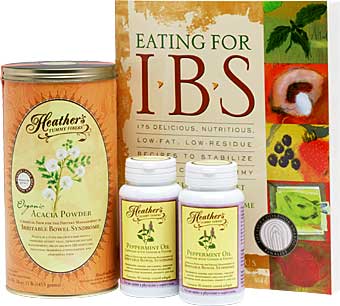
Get the IBS Diet Kit #2 - Comprehensive Help for IBS Diarrhea and Constipation!
* Eating for IBS - the Groundbreaking Diet and Cookbook
* Organic Acacia Tummy Fiber ~ Help Stabilize Bowel Motility!
* Peppermint Oil Tummy Tamers with Fennel Oil ~ prevent bloating and gas!
 Heather & Company for IBS, LLC is dedicated to serving people with Irritable Bowel Syndrome. Our mission is to provide education, support, and products that allow people with IBS to successfully manage their symptoms through lifestyle modifications.
Heather & Company for IBS, LLC is dedicated to serving people with Irritable Bowel Syndrome. Our mission is to provide education, support, and products that allow people with IBS to successfully manage their symptoms through lifestyle modifications.
We offer extensive information and tangible help for IBS, including the world's best-selling and best-reviewed books for the disorder. We provide the internet's top IBS web site resources; a twice-monthly IBS Newsletter; seminars and classes; dietary brochures for patient distribution by health care professionals; an IBS Research Library; and Heather Cooks!, a healthy cooking show on Seattle television. Much of our work is based on Heather's development of the first and only comprehensive IBS dietary guidelines and recipes, an achievement which has earned numerous awards and accolades as well as thousands of thank you letters from IBS sufferers.
Heather & Company also provides the only patient-expert moderated IBS Message Boards on the internet with forums for diet, recipes, hypnotherapy, yoga, plus Crohn's and Colitis. In addition, we support and coordinate the formation and continuation of local in-person IBS support groups across the USA, Canada, the UK, Australia, and New Zealand. We will soon have other IBS services and products available.
Our website receives over 2 million visits each year, and our newsletter is sent to over 22,000 people. We are regular exhibitors at the Digestive Disease Week and American Dietetic Association conferences.
Sponsorship opportunities are available for the message boards and this newsletter for companies and/or products that have been legitimately established as helpful for digestive disorders.
Please contact us for information.

You are receiving this email because you have expressed interest in IBS news and information.
To unsubscribe from Heather's IBS Newsletter, click here http://www.helpforibs.com/news/unsub.asp or send an email to heather@helpforibs.com.
If you are viewing this newsletter on a website and would like to subscribe for email delivery, please "Join the IBS Newsletter" here.
ANTI-SPAM PRIVACY POLICY
LEGAL DISCLAIMER - This email is not intended to replace the services of a physician, nor does it constitute a doctor-patient relationship. Any application of the recommendations in this email is at the reader's discretion. Heather Van Vorous and Heather & Company for IBS, LLC are not liable for any direct or indirect claim, loss or damage resulting from use of this email and/or any web site(s) linked to/from it. Readers should consult their own physicians concerning the recommendations in this email.
Heather & Company for IBS, LLC
409 10th Avenue East Suite 202
Seattle, WA 98102 USA
© 2004 Heather & Company for IBS, LLC. All rights reserved.
|
|
|